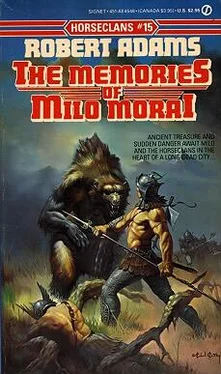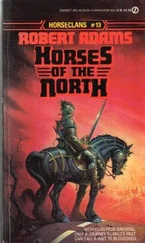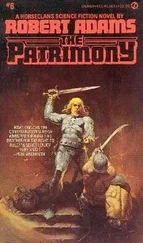“Now, let’s get this senseless business over with so that those of us who work for our livings can get back to that work. Oh, and bear this in mind, Mosix: should any sudden and calamitous fire occur in the library where are the records and the ancient books and journals, the first sergeant and I and all the other men will know exactly who is responsible if not actually guilty of the act. I trust that I make my meaning fully understood to you, this time? Well?”
Mosix was so angry that he could not speak. Small white bits of froth had appeared at the corners of his thin lips, and cold fire filled his eyes. He only ground his worn teeth and growled gutturally.
Captain Mehrdok turned to First Sergeant Rehnee. “Kahl, take a couple of the men back there to the library and remove all of the records and journals of the first through the third generations. I don’t trust these priests to keep them inviolate any longer ... or keep them at all, for that matter. If any of Mosix’s ilk or toadiesget in your way, you’ll know what to do, how to deal with them. Take what you bear away back to the armory and put it under lock and key until the other men have all read the necessary parts. When once they and their families all understand the truth about these parasitic priests as you and I now do, know that God Almighty isn’t going to strike them all dead if they leave here to find and make themselves a better life, then Mosix and the rest will have no hold upon them.”
The morning of the day after their second foray into the ruined town, Milo and Gy rode out with two of the young warriors to hunt and did so, well up to the north of the lake, with some success. Djoolya and the other women of the camp did their foragings, then returned to camp to perform their other chores. Bard Herbuht spent the morning composing a song about the killing of the strange new beast, seated—with his harp on his knee—near the rack on which that same beast’s pelt had been stretched; later, he rode down the creek a quarter mile to a wide, shallow pool to try his hand at arrowing fishes, in company with Sami-Klyd Staiklee and that young man’s constant companion, Djeri-Earl Gahdfree, who now only limped a little on his healing leg. The remainder of the young men had ridden out to the herd and now were guarding them while the cats hunted for their food.
Back from his own hunt by midafternoon, Milo and the others had but just commenced to flay their kills when Snowbelly limped into camp, bleeding from a perforated hind leg. Gingerly seating himself and commencing to lick at the wound and its peripheries, he beamed to Milo a telepathic explanation of the injury.
“Friend of cats, Chief Milo, southeast of the place you and the other twolegs have been visiting is a place of Dirtmen, as many Dirtmen as a clan. They have cattle and goats, horses, mules and a few donkeys. Their cattle and goats are bigger than those of the clans—all fat and sleek and slow of foot, with hardly any horns worthy of being so called, born prey, too fat to run and no horns to fight with.
“I had but just cut out and killed a fine, delicious calf and was taking a few mouthfuls of it before I bore it away when a pack of Dirtmen came running at me with spears and axes and a kind of a bow fastened across a thick stick. It was the shaft sped by one of those that went completely through my hinder leg like a dollop of pure fire, and when two more of those short arrows struck the earth near to me, I ran.”
Then the huge feline added wistfully, mournfully, “But I had to leave that tender, fat, tasty calf behind.”
Milo dropped his skinning knife and came over to squat beside the wounded cat and examine his injury. It was a clean and wide and by now well-drained penetration, apparently made by a shaft with a head no wider than itself. Indeed, it looked very much like the wound inflicted by a large-caliber, high-velocity rifle bullet, he reflected. What the cat had seen to be a bow fastened to a thick stick was most likely some form or type of crossbow, a powerful one, too, to drive its shaft clean through a big cat’s thick, very muscular leg with so little tearing or laceration of the tissues.
“Please, Uncle Milo,” beamed Snowbelly, “wait until this cat is healed before you ride against these Dirtmen. They owe this cat both blood price and suffering price.”
“There will be no riding against those Dirtmen, Chief Snowbelly,” Milo mindspoke in reply. “Not immediately, anyway, not if they are as numerous as you say.”
“But why, Chief Milo?” demanded the cat.
“Because, Chief Snowbelly,” Milo patiently explained, “this is not a clan or even a sept, here; we don’t number even a full dozen of warriors. No, until Clans Staiklee and Gahdfree arrive in this place, we’ll studiously avoid any contact with these Dirtmen—which means that you cats must leave their livestock alone, no matter how tempting and fat they are.”
“But when the clans and many warriors are here in this place, then we will descend upon the Dirtmen and slay them and burn down their yurts and take their females and cattle?” queried the blood-hungry cat. “Until then, this cat can wait, Chief Milo, but only until then. Vengeance must be exacted.”
Milo beamed no more. The cat had gotten what he risked at the hands of the farmers—or Dirtmen, which was what the nomads called any aggregation of settled people—and Milo felt no blood or suffering price should be exacted, but of course he could not say so to the proud, touchy feline.
If it were possible, he thought that it might be best to try to live in peace with these farmers for the two or three years it would take the clans to strip the ruins. Of course, were peace renderedan impossibility, then Chief Snowbelly would get his wish, in spades. It had happened often before, for some of these isolated settlements had bred some very peculiar people, frequently having ethnocentrism and a raging, murder-ous degree of xenophobia imbibed with the milk of their mothers.
Throughout the centuries he had been living with the people who were now become Horseclansfolk, forming them, guiding them, he had constantly preached peace and harmony with other groups of nomads and with farmers, but had almost always had to practice war against the non-Horseclans people. Because the prairies were too dry for grain and more delicate food crops for so much of the year, all of the agricultural settlements had had to locate them-selves hard onto reliable sources of water to keep their irrigation networks flowing; where these sources happened to be rivers or sizable creeks, there had seldom been problems between farmers and roving herders/hunters, but in those other cases wherein the sources of water had been large springs or small lakes, farmers had often thrown up fencing around the water, nomad herds had knocked these down, and all hell had ensued between the two groups, with the victory almost always going to the nomads for many reasons and with those farming peoples not completely extirpated or driven off their lands in extreme disorder being forever after actively hostile toward nomadic herdsmen of any stripe.
Nor had the presence of non-Horseclans nomads helped one bit, he thought. Most of them had been from their very inception little more than horse-mounted, roving gangs of extremely predaceous, law-less, pitiless, grasping types—raiders, killers, rapists, slavers, robbers and thieves, a few even cannibalistic and all of them incredibly savage and sadistic, maiming and torturing their captives for the sheer amusement derived from their sufferings. They had presented a constant menace not only to obtaining or retaining good, peaceful, trading relationships with farmers and traders from the east, but to the Horse-clansfolk themselves, since a clan camp was as likely to be raided as was a farming settlement or a trader caravan.
Читать дальше












